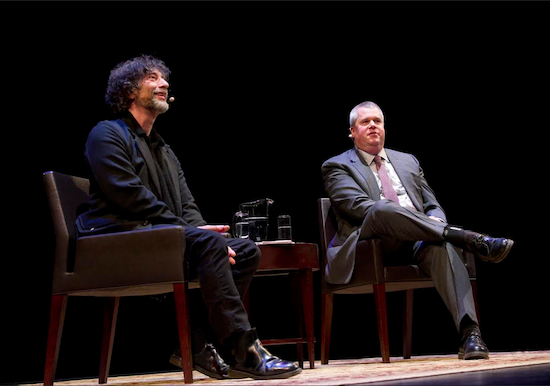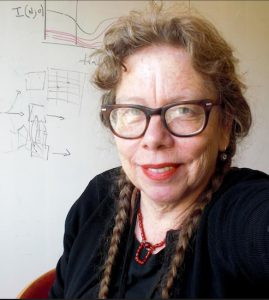
Gaiman, ‘Lemony Snicket’ share anecdotes, insight at BAM
Brooklyn BookBeat

What advice do two experienced authors have for aspiring writers? That’s simple: Get to work.
Neil Gaiman, author of “American Gods” and “Coraline,” and Daniel Handler, who many know as Lemony Snicket, author of “All The Wrong Questions; A Series of Unfortunate Events,” were on deck at the Brooklyn Academy of Music (BAM) Tuesday evening to answer questions, share amusing anecdotes and offer insight into the literary creative process. Parting from the normal procedure for such events — talking for a spell and taking questions at the end of the program — Gaiman and Handler fielded questions as they spoke, rolling them into their joke-laden dialog, and occasionally responding to odd shouts from the audience.
Gaiman recently published “Trigger Warning: Short Fictions and Disturbances,” a mishmash of stories he said did not follow any particular theme. One of the stories is a tribute to Ray Bradbury. Another is a “Doctor Who” episode. There’s also a mashup of the Snow White and Sleeping Beauty fairy tales called “The Sleeper and the Spindle.” There’s even some poetry, and Gaiman smiled while recounting a Guardian review that said “the only thing scary about the poetry in this collection is its inclusion.”
“Don Marquis once said that having poetry published was like throwing flower petals over the Grand Canyon and waiting for the boom,” he quipped.
Handler’s response proffered an American take on his English counterpart’s comment.
“I’ve heard it was like wetting yourself in dark pants — you get a feeling, but no one notices,” Handler said to groans and chuckles from the audience.
Handler just published “We are Pirates,” a tale about an unlikely partnership between 14 year-old girls and elderly people to commit acts of piracy on the San Francisco Bay.
“These ideas we come up with can seem madcap and oddball, but they’re not madcap and oddball in your head,” he said, noting at intervals the strange things that had happened to him in his life. “Real life doesn’t have to be convincing, but fiction does.”
The two chatted amiably about their differences in writing style — where they write, how they write — but found some similarities as well. For example, Gaiman said he has written in a log cabin in Wisconsin, Tori Amos’ manor house in Ireland and on planes not equipped with WiFi, among others. Handler said he stuck to four or five places around San Francisco, where he lives.
Both writers, however, said they write in longhand, which they said was advantageous because mistakes could be stricken with a single line, rather than deleted forever.
“Saving things on the computer is a problem because you have to name them,” Handler said. “It’s like your editor calling — ‘How’s it going?'”
Both also agreed that their children were great sources of material.
“The thing I loved most about having small kids is the amount of great stuff I stole from them,” Gaiman said.
And, of course, both were adamant that finishing things is part of how people become successful writers. Handler encouraged hopeful authors to press on, regardless of self-doubt.
“When I was starting out, I didn’t feel like there was room,” he said. “You think, there’s literature, and there are the stupid scribbles I’m doing and there isn’t room for it. There’s infinite room.”
Leave a Comment
Leave a Comment


